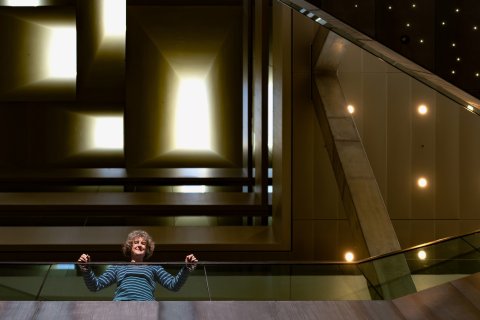Tanja Hinderer

Ever since high school I’ve been fascinated by the enormity of the universe, and the mysteries contained in black holes.
At first, I just read about these things in popular science books. But now, as an Assistant Professor at the Institute for Theoretical Physics, I’m privileged to get paid to try to solve some of these mysteries!
Gravitational waves
At the moment I’m working on two main questions. First, I’m trying to understand neutron stars, the densest objects in the universe. I’m using gravitational waves to further our fundamental understanding of how matter comes together to form the structures that we find. Second, I’m using gravitational waves to probe the nature of gravity in colliding black holes. This has only recently become possible, and it actually has the potential to prove whether Einstein’s theory of general relativity is correct.
I came to Utrecht because I wanted to stay in Europe and I’d heard all about the Netherlands’ reputation as a research hub. When I started looking, I was impressed by Utrecht University’s new sector plan for gravitational physics. They actually hired three physicists to work on different aspects of gravitational waves. So that establishes a really nice mass of people working in this new research field.
The atmosphere is very collegial and we have regular meetings to discuss problems that are relevant to all of us. I feel heard – what more can you ask for?
Team Science

I started at Utrecht University during the pandemic, working from home and teaching remotely. But still I had a good impression. The whole departmental culture makes me happy and I like interacting with the students and my PhD candidate. Now that things are back to normal, I’m enjoying it even more. The atmosphere is very collegial and we have regular meetings to discuss problems that are relevant to all of us. I feel heard – what more can you ask for?
The work-life balance is also really refreshing. We are even reminded to take our vacations! Of course, it’s also expected that we do excellent work because we work at the forefront of our field. But when the atmosphere is positive, and you come into work with a smile on your face, it’s easier to do good work. Especially with all the support we get...
Supportive working environment
I have some budget to spend on conferences to help me to stay active and visible in the field. In terms of resources, the department has a state-of-the-art computing cluster and the Faculty of Science recently installed lots of fancy teaching equipment in the classrooms. Another very useful resource for me is the Research Support Office, the team of people that helps us with writing funding applications. They also take care of the administrative side. Anyone who’s worked as a researcher will appreciate what a massive difference this makes.
dr. Tanja Hinderer
Assistant Professor

